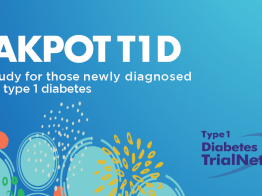
Groundbreaking study finds JAK inhibitor baricitinib slows type 1 diabetes progression
World-first study findings by Australian researchers show a daily pill containing the JAK inhibitor baricitinib can preserve insulin production in people newly diagnosed with T1D. Published in the December issue of the New England Journal of Medicine, findings were co-authored by Thomas Kay, MBBS, PhD, and Helen Thomas, PhD, St. Vincent’s Institute of Medical Research (SVI); Michaela Waibel, PhD, (SVI); Michelle So, MBBS, PhD, (SVI); and John Wentworth, MBBS, PhD, Walter & Eliza Hall/Royal Melbourne Hospital.
Recent findings from an Australian study, known as BANDIT (Baricitinib in New-onset Type 1 Diabetes), published in the New England Journal of Medicine show a daily pill containing baricitinib, a Janus kinase (JAK) inhibitor, preserved beta cell function indicating slowed disease progression in people newly diagnosed with type 1 diabetes (T1D).
JAK inhibitors work by blocking signals in the body that lead to overactivity of the immune system. They have proven effective in treating several autoimmune diseases, including rheumatoid arthritis, ulcerative colitis, and alopecia areata. Baricitinib is FDA approved for the treatment of rheumatoid arthritis and alopecia.
“When type 1 diabetes is first diagnosed, a substantial number of insulin-producing cells remain,” said Study Co-lead Thomas Kay, PhD, director of St. Vincent’s Institute of Medical Research, in Melbourne. “We wanted to see whether we could protect further destruction of these cells by the immune system.”
The study enrolled 91 people between the ages of 10 to 30 who had been diagnosed with T1D within the previous 100 days. Study participants took a daily pill—60 took baricitinib and 31 took a placebo—for 48 weeks. Those taking baricitinib continued to produce more insulin and had more stable glucose levels than the placebo group.
“This groundbreaking research shows promise as the first disease-modifying treatment of its kind for type 1 diabetes that can be delivered as a tablet,” said Professor Kay.
Funded by JDRF Australia and JDRF International, the study was conducted at St. Vincent’s Institute of Medical Research and several sites throughout Australia, including the Walter & Eliza Hall/Royal Melbourne Hospital, one of 17 TrialNet international clinical centers.
TrialNet Principal Investigator Carmella Evans-Molina, MD, PhD, Indiana University School of Medicine, said, “These exciting findings demonstrate the potential for JAK inhibitors in type 1 diabetes research. We hope to see similar results in our study testing two other types of JAK inhibitors in people newly diagnosed.”
Dr. Evans-Molina is leading TrialNet’s JAKPOT T1D study, which is currently testing two JAK inhibitors-- abrocitinib and ritlecitinib. Both medications are FDA approved for treatment of other autoimmune diseases. Abrocitinib is approved for use in people with atopic dermatitis; ritlecitinib is approved for the treatment of alopecia areata. Both are being studied in other autoimmune diseases, including ulcerative colitis, Crohn’s disease, vitiligo, and rheumatoid arthritis.
The JAKPOT T1D study is enrolling people between the ages of 12 to 35 diagnosed with T1D in the past three months. Participants will be randomly assigned to one of three groups. Each group will take a daily pill for one year: one group will take abrocitinib, one will take ritlecitinib, and one will take a placebo. If either or both treatments are successful, they may be studied in earlier stages of the disease to see if they can prevent or delay clinical diagnosis. To see if you may be eligible or learn more, visit JAKPOT T1D.
Pioneering JAK inhibitors in T1D research
For nearly 30 years, TrialNet researchers have been exploring ways to stop the immune response that leads to T1D. TrialNet research led to classification guidelines for the stages of T1D, making it possible to identify who will develop T1D and move prevention research forward.
Relatively new to T1D research, Janus kinase (JAK) inhibitors block enzymes that lead to overactivity of the immune system. The immune system is the body’s natural defense against infection and other diseases. But sometimes the immune system can become overactive and cause medical problems. By blocking JAK enzymes, JAK inhibitors help to decrease the immune system reaction that can lead to inflammation, pain and other symptoms. Since the approval of the first JAK inhibitor in 2011, a total of 10 have received FDA approval for the treatment of a variety of medical conditions involving the skin, joints, gastrointestinal tract and other systems.
After successfully using JAK inhibitors to modify the course of T1D in the lab, St. Vincent’s Institute of Medical Research in Melbourne, Australia, was the first to conduct a clinical study of a JAK inhibitor in people newly diagnosed with T1D. Groundbreaking results from the BANDIT study found that a daily pill of baricitinib, a JAK inhibitor approved for the treatment of rheumatoid arthritis, preserved beta cell function and slowed disease progression.
TrialNet is currently testing two JAK inhibitors—abrocitinib and ritlecitinib—for the first time in people with T1D. The JAKPOT T1D study is enrolling people between the ages of 12 and 35 diagnosed with T1D in the past three months.
For JAK inhibitors, like baricitinib, that prove safe and effective in slowing disease progression in people newly diagnosed with T1D, the next step will be to test them in larger numbers of people and in earlier stages of the disease.





